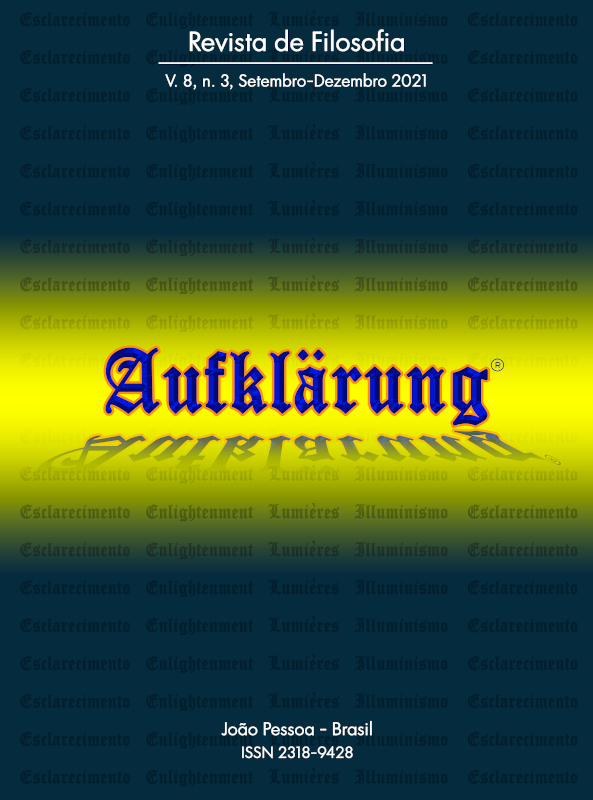Adorno reader of Kierkegaard: Or, the aesthetics of content as materialistic heritage
DOI:
https://doi.org/10.18012/arf.v8i3.60059Keywords:
Construction of the aesthetic, Kierkegaard, Hegel, Theodor Adorno, ExperienceAbstract
We intended in this paper (I) to show the elements that constitute Kierkegaard's critique of Hegel and (II) the implications of this criticism for a supposed aesthetic turn made by Adorno in his philosophy as a possibility to overcome the hegelian dialectic. The hypothesis that we will raise here is that in the criticism of Kierkegaard's conception of the aesthetic, Adorno realizes the possibility of building a notion of unrestricted rational experience that will make possible the effective exit of idealism, especially through what he will later call dialectical materialist aesthetics (materialistisch-dialektischen Ästhetik). We will try to show that when moving Kierkegaard's thought against Hegel (and vice-versa), what Adorno does, besides critically reconstructing the Hegelian idea of dialectics, is to promote the implosion of the idealism present in both authors. In other words, he performs a materialist interpretation of the dialectic that brings to consciousness the mediated (necessary) character of the subject's real and concrete experience with the world, without subtracting one pole from the other, i.e., a dialectic that aims at the disintegration of the idealistic model constitutive subjectivity without eliminating subjectivity nor its opposite pole.
Downloads
References
ADORNO, Theodor W. Kierkegaard: Konstruktion des Ästhetischen. Frankfurt am Main: Suhrkamp,1962.
ADORNO, Theodor W. Negative Dialektik. Frankfurt am Main: Suhrkamp, 1966.
ADORNO, Theodor W. Zu Subjekt und Objekt. In: ADORNO, Theodor W. Kulturkritik und Gesellschaft: Prismen. Ohne Leitbild. Gesammelte Schriften, Bd. 10.II. Frankfurt am Main: Suhrkamp, 1977.
ALMEIDA, Jorge M.; VALLS, Álvaro L. M. Kierkegaard. Rio de Janeiro: Jorge Zahar, 2007.
BUSSIUS, Júlia._Meu caro Teddie: correspondência entre Kracauer e Adorno (1923 - 1966)._Novos estudos CEBRAP, São Paulo, n._85, 2009.
GÓMEZ, Vicente. El pensamiento estético de Theodor W. Adorno. Madrid: Cátedra, 1998.
HEGEL, Friedrich. Fenomenologia do espírito. Tradução de Paulo Meneses, com a colaboração de Karl-Heinz Efken e José Nogueira Machado, SJ. Rio de Janeiro: Ed. Vozes, 2003.
HEGEL, Friedrich. Linhas fundamentais da filosofia do direito, ou, Direito natural e ciência do estado em compêndio. Trad. Paulo Meneses, Agemir Bavaresco, Alfredo Moraes, Danilo Vaz-Curado R. M. Costa, Greice Ane Barbieri e Paulo Roberto Konzen. São Leopoldo, RS: Ed. UNISINOS, 2010.
HYPPOLITE, Jean. Gênese e estrutura da Fenomenologia do Espírito de Hegel. Trad. Sílvio Rosa Filho. Prefácio de Bento Prado Jr. São Paulo: Discurso Editorial, 2003.
Kierkegaard, Søren. O conceito de angústia: uma simples reflexão psicológico-demonstrativa direcionada ao problema dogmático do pecado. Trad. Álvaro Luiz Montenegro Valls. Petrópolis, RJ: Vozes, 2017.
Kierkegaard, Søren. Postscriptum no cientifico y definitivo a migajas. Traduccion y estudio introductorio de Nassim Bravo Jordan; Prologo de Leticia Valadez Hernandez. México: Universidad Ibero americana, 2008.
Kierkegaard, Søren. Ética y estética en la formación de la personalidad. Buenos Aires: Editorial Nova, 1959.
Kierkegaard, Søren. Diário de um sedutor; Temor e tremor; O desespero humano. Traduções de Carlos Grifo, Maria José Marinho, Adolfo Casais Monteiro. São Paulo: Abril Cultural, 1979 (Os pensadores).
Kierkegaard, Søren. Kierkegaard’s journals and notebooks. Volume 8, Journals nb21–25. Volume Edited by Niels Jørgen Cappelørn, Alastair Hannay, Bruce H. Kirmmse, David D. Possen, Joel D. S. Rasmussen, and Vanessa Rumble. Princeton University Press: Princeton and Oxford, 2015.
PERIUS, Oneide. A filosofia como exercício: Walter Benjamin e Theodor W. Adorno. PUCRS, 2011. (Tese de Doutorado).
Safatle, Vladimir. Grande Hotel Abismo: por uma reconstrução da teoria do reconhecimento. São Paulo: Editora WMF Martins Fontes, 2012.
SHAKESPEARE, William. Hamlet. Trad. Millôr Fernandes. Porto Alegre: L&PM, 1997.
VALLS, Álvaro. Posfácio. In: Kierkegaard, Søren. O conceito de angústia: uma simples reflexão psicológico-demonstrativa direcionada ao problema dogmático do pecado hereditário. Trad. Álvaro Luiz Montenegro Valls. Petrópolis, RJ: Vozes; 2017, p. 87-89.
Additional Files
Published
How to Cite
Issue
Section
License

This work is licensed under a Creative Commons Attribution 4.0 International License.
Journal general policy
1.This journal works under a Creative Commons License aplied to online journals. That icence can be read in the following link: Creative Commons Attribution 4.0 International (CC BY 4.0).
2.Accordingly to this License, a)the journal declares that authors hold the copyright of their articles without restrictions, and they can archieve them as post-print elsewhere. b)the journal allow the author(s) to retain publishing rights without restrictions.
Metadata Policy for information describing items in the repository
1. Anyone may access the metadata free of charge at anytime.
2.The metadata may be re-used in any medium without prior permission, even commercial purposes provided the OAI Identifier or a link to the original metadata record are given, under the terms of a CC BY license refered for the Journal.







































